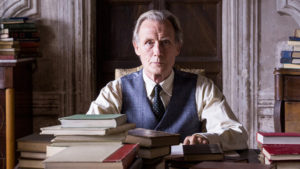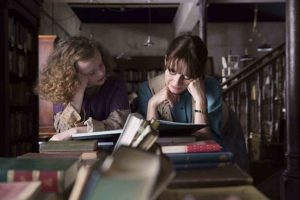 (4.5 / 5)
(4.5 / 5)
“The Bookshop” directed by Catalan feminist auteur Isabel Coixet, is a faithful adaptation of British writer Penelope Fitzgerald’s 1978 Booker Prize nominated novel.
Set in a small Suffolk coastal town in 1959, as with all Fitzgerald’s novels, it is drawn from her own experience, as she worked in a bookshop in that country for a time in the 1950’s.
The plot is about awfully nice Florence Green, (Emily Mortimer) as a widowed middle-aged woman who decides to open up a secondhand bookshop in fictionalised Hardborough and concerns her battle with the local bigwigs General and Mrs Gamart who want to convert the property into an Arts Centre. Also encountering opposition due to small-town small mindedness and ignorant philistinism she garners support from recluse Edmund Brundish, (Bill Nighy) and 13-year old Christine, whom she employs as her assistant. Into the mix comes loquacious rakish BBC man Milo North who Christine perceptively recognises is not a nice man.
The tension arises out of the burgeoning friendship that develops between our heroine and Brundish in opposition to the Machiavellian ruthfulness of the appalling Gamarts.
Isabel Coixet is a multi-award winning Catalan director, who first came to my notice with the superb, “My Life without me”. (2003). She continues to make highly acclaimed film, “Elergy” (2008) and “Endless Night” (2015) and a dominant theme throughout her dozen or so other feature movies is that the central character is a woman who takes control of her life.
Emily Mortimer is ideally cast as Florence Green, the brave and pioneering but vulnerable woman who doesn’t look for confrontation, but will take it on if she has to.
Bill Nighy who plays her ally Edmund Brundish is in usual scene-stealing form. Has there been a British actor since Denholm Elliott ho constantly manages to achieve this? All the best scenes in the film feature him.
American Patricia Clarkson is a regular feature in Coixet’s films and this is their third collaboration. This underrated actress manages the clipped British accent nicely and subtly provides us with a nasty determined character who is determined to get her way within the small community she resides in, as she always does.
Thirteen-year old actress, (at the time of filming), Honor Kneafsey as bookshop assistant Christine provides a mature performance of the precocious but charming adolescent. A couple of years on, she is already a veteran of nineteen films and looks a rare talent, even though her middle class speaking voice seems a little out of sorts with Christine’s working class antecedents.
Coixet’s Suffolk doesn’t look authentic. In fact, exterior shots were filmed on location in Northern Ireland, whilst interior sets were in Spain.
However, this isn’t really a problem, as Suffolk isn’t key to the story. As I mentioned earlier, it is where author Penelope Fitzgerald resided for a time in the 1950’s whilst she worked in a secondhand bookshop. But the location could be anywhere, and not only in the UK, where closed communities exist.
“The Bookshop” is a story about courage and determination. We learn late into the film that during WW1, Edmund was an aviator, so he is the ideal person to recognise Florence’s qualities. By contrast, General Gamart, (Reg Wilson) a veteran of the same conflict but who served in The Suffolk Regiment, comes across as the worst kind of army officer of this period, who stoops to levels of deceit to cowardly succumb to his wife’s demands.
This film is also about small town bigotry, in terms of it’s consolidated opposition to a person who doesn’t conform to their small minded way of thinking. If you are brought up in a small town or village, you may appreciate what I am writing.
The time setting of the book and film is significant. The last year of the 1950’s, a period when Britain was coming to grips with the austerity of and aftermath of WW2, marks a time with the 1960’s, just around the corner, a decade that transformed society. Also, Arts Centres, that sprung up after 1945, were becoming the trendy venues of the 1960’s and 1970’s, thereby marking a total contrast to the traditional British secondhand bookshop – an institution that in our era of online bookselling and e-books is slowly succumbing to its eventual inevitable demise.
It didn’t pass me by, that I was watching this film at Chapter, an arts centre in Cardiff. I pondered whether I had to give one thing up – secondhand bookshops or arts centres, which choice would I make, coming down in favour of the former. A difficult decision because i love both, but books have always featured strongly in my life. I have always lived in places where books take over the place. Even in the modest flat I live in now, I have upwards of two and a half thousand books. I will never be able to read all of them before I, (hopefully), gain admittance to that great library in the sky, but that doesn’t stop my sense of anticipation when I enter a secondhand bookshop to explore its contents. “You are never alone in a bookshop” is the closing line of this film, and if you feel as I do, then you will identify closely with this.
The satisfying climax works perfectly, but I don’t wish to give the game away by saying more here.
This film will divide the majority of viewers, into those who love it, and those who loathe it. The start is a little sluggish, but if you accept what it is trying to achieve on its own terms, then you will find this an utterly absorbing and memorable film.
Country: U.K., Spain, Germany
Language: English
Running time: 113 minutes
Certificate: PG
Tickets and schedule
https://www.chapter.org/book-shop-pg
Official trailer
https://www.youtube.com/watch?v=bRPNUHOS6yE
Roger Barrington
End





